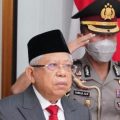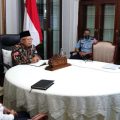Jakarta, wapresri.go.id – The potential of the waqf sector in Indonesia, especially cash waqf, is estimated to reach 180 trillion rupiahs per year. The Indonesian Waqf Agency (BWI) noted that the acquisition of cash waqf as of March 2022 went to 1.4 trillion rupiahs. This figure has increased compared to the purchase of cash waqf collected during 2018-2021 worth 855 billion rupiahs.
However, the acquisition of cash waqf is only about half a percent of the total potential. One of the reasons for this gap between potential and realization is that the literacy level of waqf is still low. Namely, the index score is only 50.48 based on a study by BWI and the Ministry of Religion in 2020.
For this reason, strengthening waqf literacy in a sustainable manner needs to be encouraged, especially by waqf activists such as the Indonesian Waqf Journalists Forum (Forjukafi).
“It is necessary to strengthen literacy, mainly on three elements. Namely literacy on waqf property, the designation of waqf property, and waqf institutions,” said Vice President K.H. Ma’ruf Amin when opening a virtual Forjukafi working meeting, from the Vice President’s Official Residence, Jalan Diponegoro Number 2, Central Jakarta, Friday (07/10/2022).
Furthermore, the Vice President explained that the variety of waqf object assets is not limited to fixed assets, such as land, buildings, or buildings, but can also be in the form of money.
“The concept of cash waqf must be one of the focuses of literacy content so that people understand it properly,” he said.
Next, said the Vice President, the allocation of waqf property is not only for worship facilities but can also be used for various purposes, such as health services, education, and economic empowerment.
Meanwhile, the institutional element of waqf, added the Vice President, is closely related to the belief of the wakif (waqf giver) that Nazir has managed the waqf in a transparent and accountable manner.
“The public needs to recognize the management and operations of good waqf management institutions and which Nazir institutions have registered with BWI, including various success stories of waqf management,” said the vice president.
Therefore, according to the Vice President, the National Waqf Index that BWI has developed as a tool for measuring waqf performance also needs to be disseminated to the general public.
“I think the public needs to know about this to be more confident that waqf institutions will continue to be encouraged to be better in the future,” he added.
Regarding this literacy, the Vice President believes that the presence and involvement of Forjukafi journalists, as providers of accurate and qualified information, can build positive public opinion while increasing general literacy about waqf.
“The more communicative and massive news about waqf in various media channels is the key to increasing public literacy about waqf,” said the vice president.
Previously, the General Chairperson of Forjukafi Wahyu Muryadi assessed this waqf journalist forum as an extraordinary awareness to jointly advance waqf in Indonesia. The concern of journalists, Wahyu said, is needed considering that so far, the issue of waqf is less popular than the issue of zakat, infaq, and alms. Hence, there are still misunderstandings about waqf.
“I hope for support from all parties, especially those present, to raise waqf for the welfare of this country wholeheartedly. Hopefully, this first working meeting will provide the greatest benefit to Muslims, the nation,” said Wahyu.
Present at this event were the Chairman of the Indonesian People’s Consultative Assembly, Bambang Soesatyo, the members of the Nahdlatul Ulama Teacher Association (PERGUNU), and journalists from various platforms.
Meanwhile, the Vice President was accompanied by the Head of the Secretariat of Vice President Ahmad Erani Yustika, Deputy for Economic Development Policy Support and Competitiveness Improvement Guntur Iman Nefianto, Special Staff for the Vice President for Communication and Information Masduki Baidlowi, and Special Staff for the Vice President for Poverty Reduction and Regional Autonomy Muhammad Imam Aziz. (SM/ BPMI-Setwapres)







